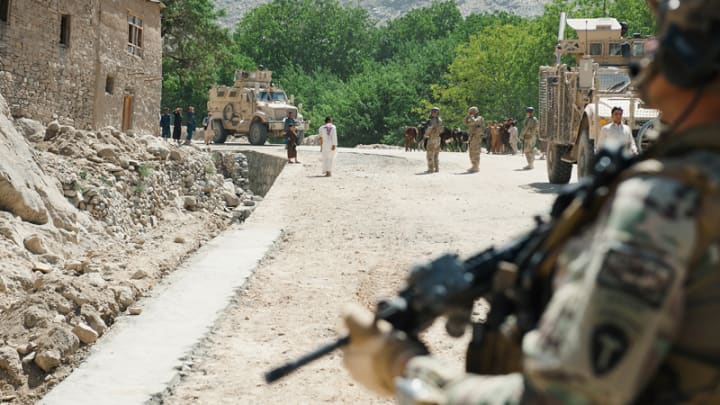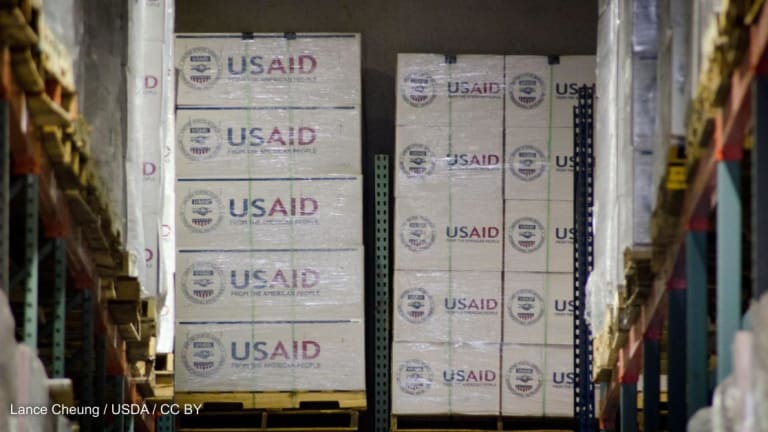
WASHINGTON — The United States government’s new approach to stabilization seeks to avoid “large-scale reconstruction efforts” in the future while maximizing the value of taxpayer dollars and pressing international partners to pay their fair share, according to a copy of the Stabilization Assistance Review obtained by Devex.
USAID, State, and DOD to release first-ever Stabilization Assistance Review
The Trump administration is releasing the first of its kind interagency review of United States overseas involvement that creates a framework for how the State Department, U.S. Agency for International Development, and Department of Defense can coordinate their efforts to streamline diplomacy, aid, and military operations around the world to maximize resources and results.
The SAR is a document jointly produced by the Department of State, the U.S. Agency for International Development and the Department of Defense. It lays out challenges the U.S. government has faced in the past in its stabilization efforts and a framework for how the three entities can better work together. It is meant to be a first step in further streamlining the U.S. government’s engagement in stabilization projects.
“[T]here is no appetite to repeat large-scale reconstruction efforts, and therefore our engagement must be more measured in scope and adaptable in execution,” the SAR said. “The United States must be more selective and targeted about how we define stabilization missions, deploy our limited resources, burden-share with local and international partners, and ultimately produce more tangible, long-term outcomes for our taxpaying public.”
The SAR defines the typical timeline for U.S. stabilization efforts to between one and five years, noting that the process is intended to be “short-term in nature,” but the context of a volatile area will be taken into account.
“Th[e] lack of standardization in definition and process leads to repeated mistakes, inefficient spending, and poor accountability for results. One of the greatest challenges to stabilization is that different U.S. departments and agencies have different priorities.”
— United States Stabilization Assistance Review“There is no single set time frame for stabilization that is generalizable to all cases, but in no case should it be open-ended,” the SAR said. “Stabilization should also include strategic communication strategies that emphasize host-nation ownership from the outset to avoid creating dependencies or local resentment.”
The review looked at eight case studies of past U.S. engagement in conflict-affected areas: Afghanistan, Iraq, Kosovo, Libya, Mali, Nigeria, Pakistan, and Somalia. In addition, it involved a literature review, interviews, and surveys with U.S. government and external experts, a questionnaire completed by six DOD combatant commands, and a qualitative analysis of U.S. foreign assistance spending in conflict-affected areas from fiscal year 2009 to fiscal year 2017.
The report noted that the world is facing an unprecedented number of conflicts that impact U.S. national security and economic interests, making a well-thought-out and agency-coordinated response all the more important. The rise of nonstate actors also complicates efforts, and makes political reform more difficult to achieve. A failure to address these conditions means that more than one-half of armed conflicts relapse after peace has been reached.
Over the past decade, the SAR said more than one-third of U.S. foreign assistance has gone to countries with ongoing violent conflicts.
The framework proposed in the SAR aims to establish a U.S. government-wide definition of stabilization, which has been a missing piece in the way State, USAID, and DOD approach their responses to conflicted areas.
“This lack of standardization in definition and process leads to repeated mistakes, inefficient spending, and poor accountability for results,” the SAR said. “One of the greatest challenges to stabilization is that different U.S. departments and agencies have different priorities.”
The SAR dictates that State will be the lead federal agency for all stabilization efforts, USAID will be the lead implementing agency for nonsecurity assistance, and DoD will play a supporting role.
The proposed framework includes developing political strategies based on evidence and analysis; promoting “a fair, purposeful” division of labor with both national partners and international donors; clarifying State, USAID, and DOD roles to improve performance and reduce duplication; improving capacity of civilians alongside DOD; and “sequence and target” efforts “in a more measured fashion.”
The analysis also offers recommendations for how U.S. agencies can better cooperate with other donor countries, local government, and NGOs. The U.S. government must also be “deliberate and precise” and deciding how and when to promote private sector investment.
“There needs to be a clear understanding at the outset of a stabilization effort of what the partner nation government is willing and expected to deliver in terms of political and financial commitments,” the SAR said. “There should also be a clear division of labor among international donors, based on analysis that accounts for each donor’s comparative advantage.”
The reforms will encourage a “more disciplined approach” to stabilization and help eliminate “mistakes of the past.”
“In the past, there has been a rush to initiate high-cost, sectoral programming before there is a foundation of inclusive political systems, basic security, and a reliable and legitimate partner government at the national level,” the SAR said. “It is imperative that stabilization efforts incorporate transition plans to economic growth, private sector vibrancy, and responsive governance, with an end state of self-sufficiency, lest any progress achieved by those activities is not sustained and lost.”
The SAR was led by the State Department’s Office of U.S. Foreign Assistance Resources and the Bureau of Conflict and Stabilization Operations; USAID’s Office of Transition Initiatives, Office of Conflict Management and Mitigation, and Bureau of Policy, Planning and Learning; and the Office of the Deputy Assistant Secretary of Defense for Stability and Humanitarian Affairs and the U.S. Army Peacekeeping and Stability Operations Institute.
The document emphasizes the need of both the U.S. government and other development partners to be flexible in their expectations during stabilization and recognize the need to modify strategies according to realities on the ground. This includes adjusting political objectives to more closely align with local interests.
“Multilateral development banks, other donors, and the private sector should be part of the process as early as possible, while being realistic about the challenges and risks in post conflict investment climates,” the SAR said. “At an operational level, we should continue to engage pooled donor mechanisms in some cases to mobilize other partner resources.”
Ultimately, State, USAID, and DOD will use the framework to avoid creating dependency in conflict-ridden nations.
“Stabilization assistance is not an entitlement, and continued U.S. government assistance should depend on results,” the SAR said.




